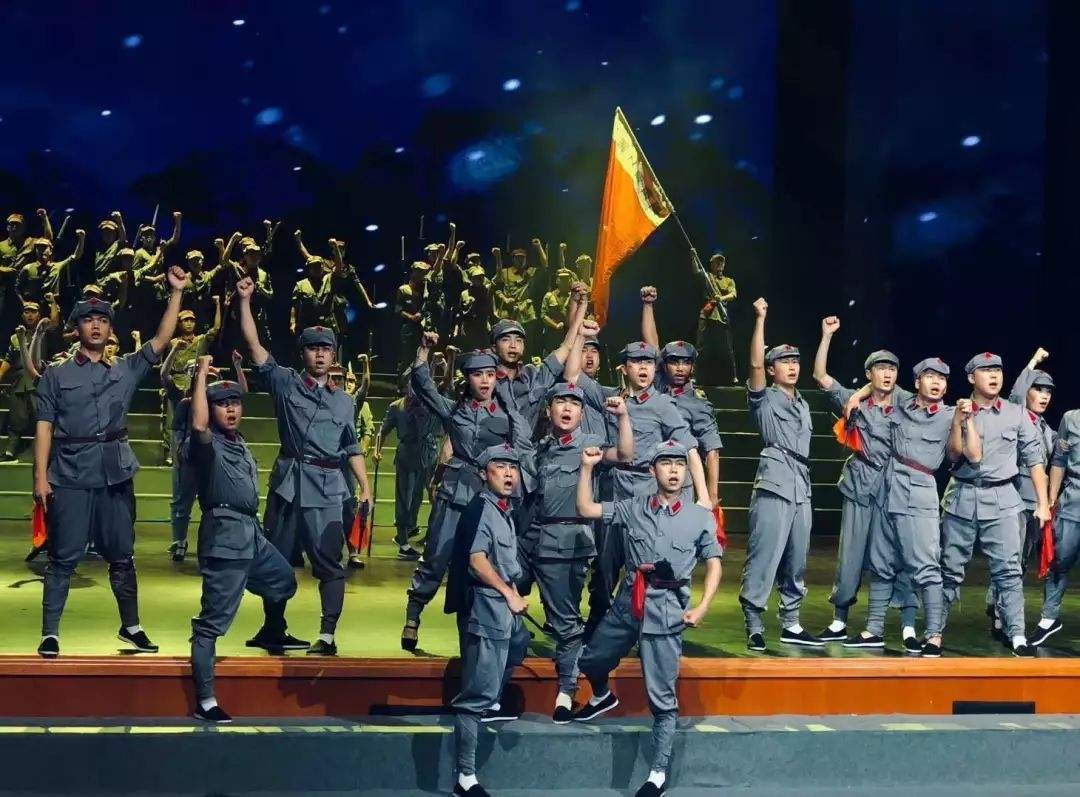For young people after the 80s and 90s, many people have not seen the large-scale musical and dance epic "Dongfang Hong", and may not even have heard of this name. And it, at that time, was a sensational large-scale production in the country, and it was the biggest cultural feast. Now, the well-known "Songhua River", "Go to the Enemy's Rear", "Big Knife March", "Guerrilla Song", etc., are all from "Dongfang Hong". This play, as a literary and artistic performance for the 15th anniversary of the founding of the People's Republic of China, was praised by posterity as "a classic of Chinese music and dance in the twentieth century".

Every age is accompanied by blood and tears. After the Industrial Revolution in the West, the Qing Dynasty failed to keep up with the pace of the times and gradually sank. The cannon sound of the accompanying Nanchang uprising, after external worries and internal difficulties, finally came to an end. The occurrence of the Xinhai Revolution put an end to the feudal monarchical system that ruled China for thousands of years and greatly promoted the emancipation of the Chinese nation's thinking. But where China is going, we don't have a direction.
The victory of the October Revolution gave the Chinese a glimmer of hope – to take the socialist road and create proletarian power. With the help of the Comintern, the Communist Party of China took root in the land of China and grew rapidly like a spark on fire.
After 28 years of arduous struggle, the People's Republic of China was born.
In October 1960, He Long, Luo Ruiqing, Liu Yalou and others were invited to participate in the 10th anniversary of the Chinese Volunteer Army's participation in the Korean War. During their visit to the DPRK, the DPRK performed a large-scale song and dance for them called "Three Thousand Miles of Rivers and Mountains." The momentum of the performance is very large, which makes Liu Yalou's eyes shine. The following year, Liu Yalou assigned a task to the Air Politics Cultural and Labor Troupe: to create a revolutionary historical song evening.
In 1961, during the "August 1st" Founding Day, the "Revolutionary Historical Song Performance and Singing" of the Air Politics Cultural and Labor Troupe was performed for the first time at the Zhongshan Park Music Hall in Beijing. For this work, the audience has a strong response, especially some old comrades, who are even more praised after watching it.
Later, the Air Politics Cultural and Labor Troupe was invited to Shanghai to perform the "Revolutionary Historical Song Performance". In this year, the literary and art workers in Shanghai created a larger program in accordance with the ideas of the Air Politics Cultural and Labor Troupe, which was named "Singing And Advancing Under the Banner of Mao Zedong", which was later renamed "Dongfang Hong".
In July 1963, Premier Zhou watched a large-scale song and dance in Shanghai, "Advancing Under the Banner of Mao Zedong." After watching the performance, Premier Zhou had an idea: on the occasion of the 15th anniversary of the founding of the People's Republic of China, he would use the art form to make a large-scale evening party combining song, dance and poetry to present gifts for the National Day.
In this way, the creation and rehearsal of the musical and dance epic "Dongfang Hong" was put on the agenda of the State Council. It can be said that "Dongfang Hong" was personally planned by Premier Zhou.
In the repertoire of "Dongfang Hong", it was not possible to find a suitable song for a while to express the reluctance of the people in the base areas to bid farewell to the Red Army. When the Air Politics Cultural and Labor Corps accepted the task, Commander Liu Yalou once had an order: "Collect revolutionary songs, do not create." ”
"Regardless of Commander Liu's ban, create a song." The bold moves of several creators have achieved the later song "Ten Gifts to the Red Army". Zhang Shixie composed the lyrics, Zhu Zhengben composed the music.
Because it was created and did not conform to General Liu Yalou's orders, the song was not signed. Until Liu Yalou's death, he did not know that "Ten Send the Red Army" was a "disobedient" song.
In 2001, the TV series "Long March" was broadcast on CCTV, and the ending song was "Ten Sending the Red Army". There are words "Zhang Shixie composed the lyrics, Zhu Zhengben arranged the music", which pushed the two authors who had been silent for 40 years to the forefront.